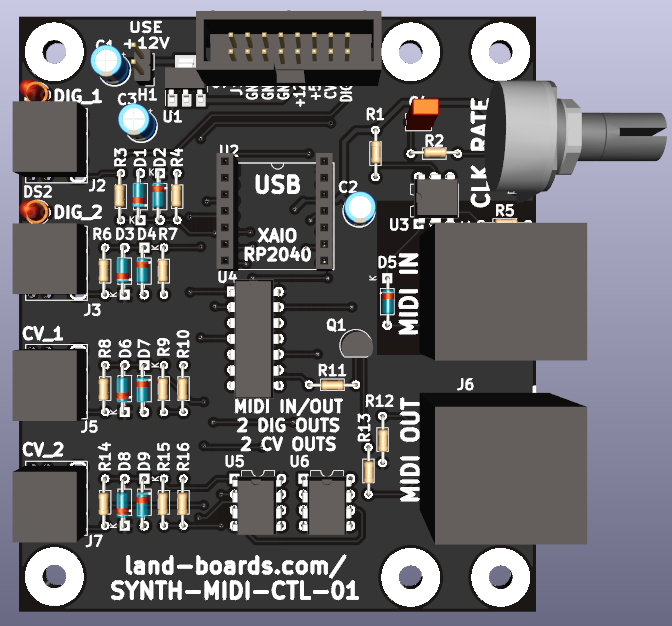Difference between revisions of "SYNTH-MIDI-CTL-01"
Jump to navigation
Jump to search
Blwikiadmin (talk | contribs) |
Blwikiadmin (talk | contribs) |
||
| Line 25: | Line 25: | ||
* Card is '''not''' a Eurorack card | * Card is '''not''' a Eurorack card | ||
** Probably too deep, needs cabling | ** Probably too deep, needs cabling | ||
| + | * (6) 6-32 Mounting holes | ||
| + | ** Stacks with [[SYNTH-VCO-01]] card | ||
== Reference Docs == | == Reference Docs == | ||
Revision as of 09:05, 23 September 2022
Features
- Adapted from HAGIWO's MIDI to CV module
- Translate from Japanese to English using browser
- Controller is XAIO RP2040
- Arduino MIDI library has not yet been ported to Pico so will need to use CircuitPython
- MIDI In
- Standard MIDI Jacks
- MIDI out jack for future functionality
- (2) 0-5V Analog CV outs
- MCP4822 12-bit D/A - SPI Interface
- Use with SYNTH-VCO-01
- CV1 = V/OCT
- CV2 = MOD
- Digital Outs
- Gate
- Clock
- Pot supports setting Clock rate
- Standard EuroRack 6 pin header
- Supports 12V in with on-board 5V regulator
- 5V regulator can be not installed if 5V is available on EuroRack connection
- Card is not a Eurorack card
- Probably too deep, needs cabling
- (6) 6-32 Mounting holes
- Stacks with SYNTH-VCO-01 card
Reference Docs
- adafruit_midi CircuitPython API
- MIDI Communication
- elkayem midi2cv GitHub page _ Nano based project
- Arduino MIDI library has not yet been ported to Pico so will need to use Python
- Drives 4 CV outputs: Pitch Blend, Control, Note, Velocity
- This card only drives Note (Voltes/Oct, Mod)
- MIDI Controller in Python
- Principles of Voltage Control
- Creative Control Strategies: MIDI to CV
- EuroPi
- Eurorack Beginners Guide
- Eurorack Wiki page
- PicoPicoSynth
